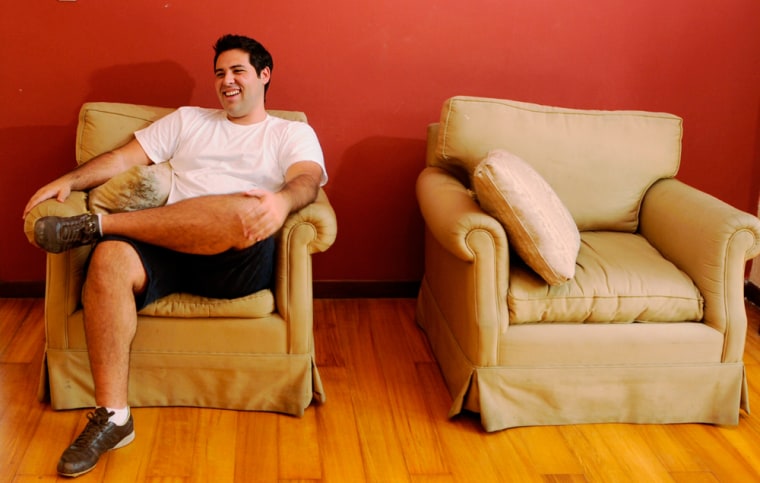For his outspoken opposition to President Hugo Chavez, Venezuela's best-known college student has been called a U.S. collaborator and has had his nose broken in a scuffle.
On a wall opposite the converted garage where Yon Goicoechea lives, graffiti denounces him as a defender of the rich and powerful. Now state television airs a cartoon of him holding a fistful of dollars and stamped "Made in USA."
Lately the attacks have intensified because of the $500,000 award he received last month from the Cato Institute, a U.S. think tank that advocates individual liberties and free markets, for his "pivotal role in organizing and voicing opposition to the erosion of human and civil rights in his country."
The 23-year-old law student and protest leader arrives in the U.S. Monday and will collect the Milton Friedman Prize for Advancing Liberty, named for the late Nobel laureate economist, in New York on Thursday.
Activities have drawn praise, scorn
"I think in Venezuela you can't speak of democracy because all branches of government are controlled by one single branch," he said in an interview with The Associated Press. "It's growing dangerously close to a totalitarian regime."
Still, his activities and occasional triumphs suggest Venezuela's opposition has room to maneuver, despite Chavez's efforts to tighten his socialist grip on the country.
Goicoechea first drew attention last year, when he led protests against a government decision that forced an opposition TV channel off the air.
His big moment came when he helped organize protest marches and made passionate speeches against constitutional changes that would have included removing presidential term limits and giving Chavez emergency powers to suspend civil liberties.
The reform was rejected in a December referendum, dealing Chavez his worst political defeat.
Goicoechea (pronounced Goy-co-e-CHAY-uh) says an early influence was his Cuban-born grandmother, who left the island in the 1940s and later became an ardent foe of Fidel Castro.
Goicoechea was just 14 when Chavez was elected in 1998, and says she warned him: "That guy's a communist."
Resists political labels
An honor student at the private Andres Bello Catholic University, he emerged as a charismatic speaker while rallying students to vote "no" to Chavez's "dictatorial reform" and calling for "struggle against totalitarianism."
Goicoechea resists labels of right, left or center. He says Latin America needs greater freedom and social justice, and he backs private enterprise against state interference.
Venezuela, he maintains, is a failed state, with ineffective schools, a dysfunctional bureaucracy and widespread corruption.
Chavez dismissed last year's protests as rich kids serving his critics in Washington. The $500,000 from the Cato Institute has led to posters going up on Caracas streets calling Goicoechea "Half-a-Million Yon." Mario Silva, a pro-Chavez talk show host, claims he's "a launderer of money that's going to be used to continue conspiring against Venezuela."
At a university event where Goicoechea was to speak last year, he was pummeled by several young men in the crowd, emerging with a fractured nose.
Another issue on his mind is his father, who has been in prison for 3 1/2 years awaiting trial for what his son says was a fatal "case of self-defense."
Wants money for foundation
Goicoechea won't discuss details for fear of repercussions against his father, a lawyer who he says was never politically active. But he voices indignation at a system that holds citizens so long without trial.
Goicoechea is unapologetic about accepting the prize, which previously has gone to such advocates of free-market economics as former Estonian Prime Minister Mart Laar and Peruvian economist Hernando de Soto.
He says he is still studying the legal requirements for bringing the prize money into Venezuela, but wants to use it to develop a foundation and train others in Latin America who share his values. He has addressed students in Bolivia, Argentina and Ecuador, all of which have pro-Chavez presidents, as well as at Harvard and other U.S. colleges. For now, he and other students are setting up the foundation in a Caracas house loaned by a human rights activist, Gustavo Tovar Arroyo, who wrote a book about their movement. It has the air of a college dormitory, with ragged armchairs and students snacking on Pringles.
In the interview, Goicoechea likened his optimism to that of his favorite candidate in the U.S. presidential race, Barack Obama:
"Like Obama said, 'We can change.' The world is changing."
